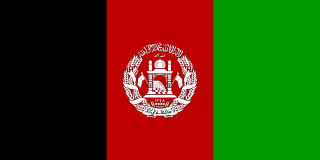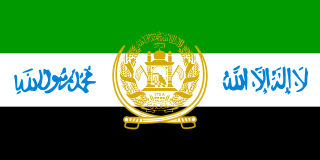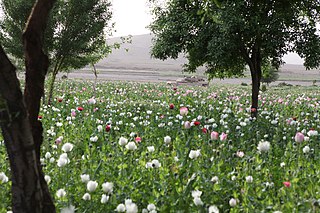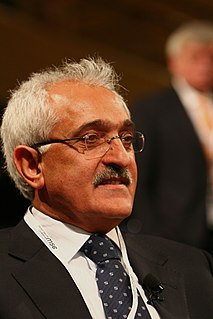 W
WAbdullah Abdullah is an Afghan politician who leads the High Council for National Reconciliation (HCNR), which is expected to lead the intra-Afghan peace talks with the Taliban. He served as Chief Executive Officer of the Unity Government of the Islamic Republic of Afghanistan from September 2014 until March 2020. From October 2001 to April 2005, he served as Minister of Foreign Affairs. Prior to that he was a senior member of the Northern Alliance working as an adviser to Ahmad Shah Massoud. He also worked as a medical doctor during the late 1990s.
 W
WThis article covers the Afghan history between the Taliban's conquest of Kabul and their establishing of the Islamic Emirate of Afghanistan on 27 September 1996, and the U.S. and U.K. invasion of Afghanistan on 7 October 2001: a period that was part of the Afghan civil war that had started in 1989, and also part of the war in Afghanistan that had started in 1978.
 W
WThe Afghan Interim Administration (AIA), also known as the Afghan Interim Authority, was the first administration of Afghanistan after the fall of the Taliban regime and was the highest authority of the country from 22 December 2001 until 13 July 2002.
 W
WThe Transitional Islamic State of Afghanistan (TISA), also known as the Afghan Transitional Authority, was the name of a temporary administration of Afghanistan put in place by the loya jirga of June 2002. It succeeded the original Islamic State of Afghanistan and preceded the current Islamic Republic of Afghanistan.
 W
WThe Combined Security Transition Command – Afghanistan is a multinational, U.S. led, military organization during the War in Afghanistan.
 W
WThe following addresses the events in Northern Afghanistan between April 2009 and 2014. While this part of the country had long been relatively peaceful compared to the all-out war zones of the south and east, tensions would flare up again in 2008 when the German soldiers deployed to the area came under attack more often, leading to the deaths of the several soldiers. Previously hindered by national caveats, the deteroriating security situation prompted the German-led Regional Command North to launch a series of operations to take on the rising insurgency. Concerted operations began after an insurgent attack on PRT Kunduz within minutes of German Chancellor Angela Merkel's departure from a visit. Within two years, the German presence would be doubled and additional reinforcements from the American ISAF contingent were called in, including heavy German armoured vehicles and US aviation assets, allowing for a more aggressive approach towards the insurgency.
 W
WAshraf Ghani Ahmadzai is an Afghan politician, academic, and economist who is serving as President of Afghanistan. He was first elected on 20 September 2014 and was re-elected in the 28 September 2019 presidential election. He was announced the winner after a protracted process in February 2020 and was sworn in for a second term on 9 March 2020. An anthropologist by education, he previously served as Minister of Finance and the Chancellor of Kabul University.
 W
WAfter the ousting of the Taliban in 2001, repeatedly international conferences on the future of Afghanistan were held at several places. the first conference took place from 27 November to 5 December 2001 on the Petersberg in Königswinter near Bonn.
 W
WThe International Security Assistance Force (ISAF) was a NATO-led military mission in Afghanistan, established by the United Nations Security Council in December 2001 by Resolution 1386, as envisaged by the Bonn Agreement. Its main purpose was to train the Afghan National Security Forces (ANSF) and assist Afghanistan in rebuilding key government institutions, but was also engaged in the War in Afghanistan (2001–present) against the Taliban insurgency.
 W
WThe Islamic Emirate of Afghanistan was a totalitarian Islamic state established in September 1996, when the Taliban began their governance of Afghanistan after the fall of Kabul. At its peak, the Taliban regime controlled approximately 90% of the country, whereas remaining regions in the northeast were held by the Northern Alliance, which maintained broad international recognition as a continuation of the Islamic State of Afghanistan. After the September 11 attacks and subsequent declaration of a "War on Terror" by the United States, international opposition to the regime drastically increased, with diplomatic recognition from the United Arab Emirates and Pakistan being rescinded. The Islamic Emirate ceased to exist on 17 December 2001 after being overthrown by the Northern Alliance, which had been bolstered by the ISAF coalition established after a U.S.-led invasion of the country two months prior.
 W
WThe Islamic State of Afghanistan was the government of Afghanistan, established by the Peshawar Accords on 26 April 1992 by many, but not all, mujahideen Afghan parties, after the fall of the communist government. From 1996, it became a government in exile when the Taliban took power of Kabul and established the mostly unrecognized Islamic Emirate of Afghanistan. The Islamic State was in control of the country again after the Taliban government was overthrown by the United States in 2001 after the invasion. In 2002 it was succeeded by the Transitional Islamic State of Afghanistan.
 W
WHamid Karzai is an Afghan politician who was the president of Afghanistan from 22 December 2001 to 29 September 2014. He is also the leader of the Popalzai Durrani tribe of Pashtuns.
 W
WZeenat Quraishi Karzai is the wife of former President of Afghanistan Hamid Karzai and was the First Lady of Afghanistan from 2001 to 2014. Originally from the city of Kandahar, she moved to Kabul where she lived at the Presidential Palace with her husband and their four children.
 W
WThe Afghan Northern Alliance, officially known as the United Islamic Front for the Salvation of Afghanistan, was a united military front that came to formation in late 1996 after the Islamic Emirate of Afghanistan (Taliban) took over Kabul. The United Front was assembled by key leaders of the Islamic State of Afghanistan, particularly president Burhanuddin Rabbani and former Defense Minister Ahmad Shah Massoud. Initially it included mostly Tajiks but by 2000, leaders of other ethnic groups had joined the Northern Alliance. This included Karim Khalili, Abdul Rashid Dostum, Abdullah Abdullah, Mohammad Mohaqiq, Abdul Qadir, Asif Mohseni and others.
 W
WAfghanistan has been the world's leading illicit opium producer since 2001. Afghanistan's opium poppy harvest produces more than 90% of illicit heroin globally, and more than 95% of the European supply. More land is used for opium in Afghanistan than is used for coca cultivation in Latin America. In 2007, 93% of the non-pharmaceutical-grade opiates on the world market originated in Afghanistan. This amounts to an export value of about US$4 billion, with a quarter being earned by opium farmers and the rest going to district officials, insurgents, warlords, and drug traffickers. In the seven years (1994–2000) prior to a Taliban opium ban, the Afghan farmers' share of gross income from opium was divided among 200,000 families. As of 2017, opium production provides about 400,000 jobs in Afghanistan, more than the Afghan National Security Forces. The opium trade spiked in 2006 after the Taliban lost control of local warlords. In addition to opium, Afghanistan is also the world's leading producer of hashish.
 W
WZarar Ahmad Moqbel Osmani is a politician in the Islamic Republic of Afghanistan who served as Minister of Foreign Affairs from 2013 to 2015 and Minister of Interior from 30 September 2005 to 11 October 2008. He previously served as Minister of Counter Narcotics and as Governor of Parwan Province. Prior to this he served as Chief of Police of Parwan province and as First Secretary to Afghan Embassy in Tehran. He also joined the mujahideen during the Soviet–Afghan War, fighting against the Afghan government led by Mohammad Najibullah.
 W
WThe Karzai administration was the government of Afghanistan under President Hamid Karzai, who became the head of state of Afghanistan in December 2001 after the Taliban government was overthrown. Karzai was appointed at the 2002 Loya Jirga as the Interim President of the Afghan Transitional Administration. After the 2004 Afghan presidential election, he became the President of Afghanistan.
 W
WDr. Rangin Dadfar Spanta is a politician in Afghanistan who last served as National Security Advisor of President Hamid Karzai. Prior to that he served as Foreign Minister from April 2006 to January 2010.
 W
WSpecial Inspector General for Afghanistan Reconstruction (SIGAR) is the U.S. government's leading oversight authority on Afghanistan reconstruction. Congress created the Office of the Special Inspector General for Afghanistan Reconstruction to provide independent and objective oversight of the Afghanistan Reconstruction funds. Under the authority of Section 1229 of the National Defense Authorization Act for Fiscal Year 2008, SIGAR conducts audit, inspections, and investigations to promote efficiency and effectiveness of reconstruction programs, and to detect and prevent waste, fraud, and abuse of taxpayer dollars. SIGAR also has a hotline that allows individuals to report suspected fraud.
 W
WOperation Tar Heels was a military operation launched by US Marines in Laghman Province, eastern Afghanistan. Patrols of around 30 men were ambushed in several places, but the Taliban attackers were driven back. The Marines lost team leader Nicholas Kirven in the meantime. Otherwise, the operation to patrol Laghman Province was a success.
 W
WThe Transitional Islamic State of Afghanistan (TISA), also known as the Afghan Transitional Authority, was the name of a temporary administration of Afghanistan put in place by the loya jirga of June 2002. It succeeded the original Islamic State of Afghanistan and preceded the current Islamic Republic of Afghanistan.
 W
WThe United Nations Assistance Mission in Afghanistan (UNAMA) is a political UN mission established at the request of the Government of Afghanistan to assist it and the people of Afghanistan in laying the foundations for sustainable peace and development. UNAMA was established on 28 March 2002 by United Nations Security Council Resolution 1401. Its original mandate was to support the Bonn Agreement. Reviewed annually, this mandate has been altered over time to reflect the needs of the country and was extended for another year on 15 September 2020, by Resolution 2543 (2020).
 W
WThe War in Afghanistan began following the United States invasion of Afghanistan on 7 October 2001, when the United States of America and its allies successfully drove the Taliban from power in order to deny Al-Qaeda a safe base of operations in Afghanistan. Since the initial objectives were completed, a coalition of over 40 countries formed a security mission in the country called International Security Assistance Force, of which certain members were involved in military combat allied with Afghanistan's government. The war has afterwards mostly consisted of Taliban insurgents fighting against the Afghan Armed Forces and allied forces; the majority of ISAF/RS soldiers and personnel are American. The war is code named by the U.S. as Operation Enduring Freedom (2001–14) and Operation Freedom's Sentinel (2015–present); it is the longest war in U.S. history.